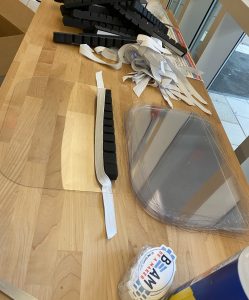Second-year Physician Assistant Studies students are teaming up at UNC-Chapel Hill’s Be a Maker (BeAM) makerspace where the University community can design and make of physical objects for education, research, entrepreneurship and recreation to assemble personal protective equipment (PPE) in response to the COVID-19 pandemic.

Lindsey Price and Alison Baron-Johnson, whose clinical rotations are put on hold because of the pandemic, learned about the opportunity to use the BeAM makerspace thanks to an online course offered by UNC School of Medicine in response to the pandemic. Price and Baron-Johnson applied to use the space and were selected based off of certain criteria, such as self isolating from others and a commitment to maintain at least six feet of space between themselves and others in order to reduce odds of spreading the virus.
“I really enjoy working with people, and I think it’s really good to have a provider who is empathetic and is a good patient advocate,” Baron-Johnson said. “I think that’s something I can offer as a future PA.”
The pair assists students from other disciplines, including medicine, chemistry, and marine biology, with the PPE. Specifically, Price and Baron-Johnson assemble face shields and head guards. They pack them in bags of five for various hospitals and health care facilities that might need them.
Price, who worked as an emergency department nurse before pursuing PA school, said she felt a desire to give back, especially since she couldn’t immediately return to health care.
“I feel like with this whole situation, we kind of all jumped to ‘should I go back to work?’ We have this innate sense that we should be helping. This kind of gave us middle ground of being able to do that.”
In three-to-four hours shifts, Price and Baron-Johnson can assemble up to 150 shields.
It’s very tangible work, that you can see,” Price said. “It’s very rewarding.”
Baron-Johnson said it’s vital for communities and providers to come together as a community in order to provide high-quality patient care, especially given the nationwide shortage of PPE.
“It has been really disheartening to know that providers have to go out there without PPE,” she said. “It just made me feel like I was really able to go out there and help.”
Paul Chelminski, the program’s director, said this generation of students has the ability to serve alongside a diverse team of professionals.
“The work of these students shows that the passion to serve is an irresistible professional force in their lives,” Chelminski said.
As future PAs, Price and Baron-Johnson said the pandemic has led to a heightened awareness of ways health care providers can respond to various causes.
“I don’t think the world will ever be the same again,” Baron-Johnson said. “Going out into the field, no matter what field you pick, I think you have to be aware that you might be pulled something like this in the future.”
The Physician Assistant Studies program is housed in the Department of Allied Health Sciences. Paul Chelminski (’95 MD, ’03 MPH) has served as program director since its inception in 2015.